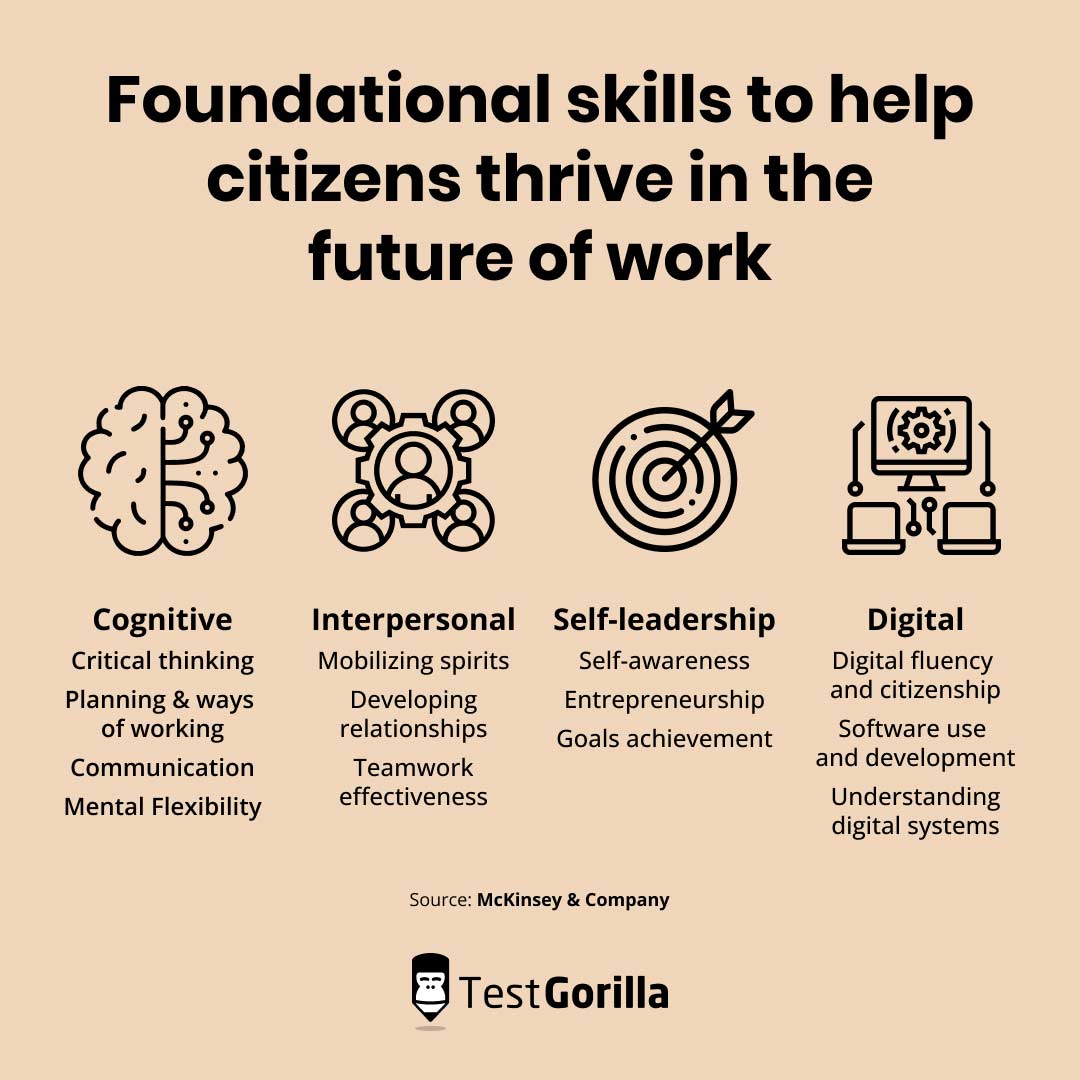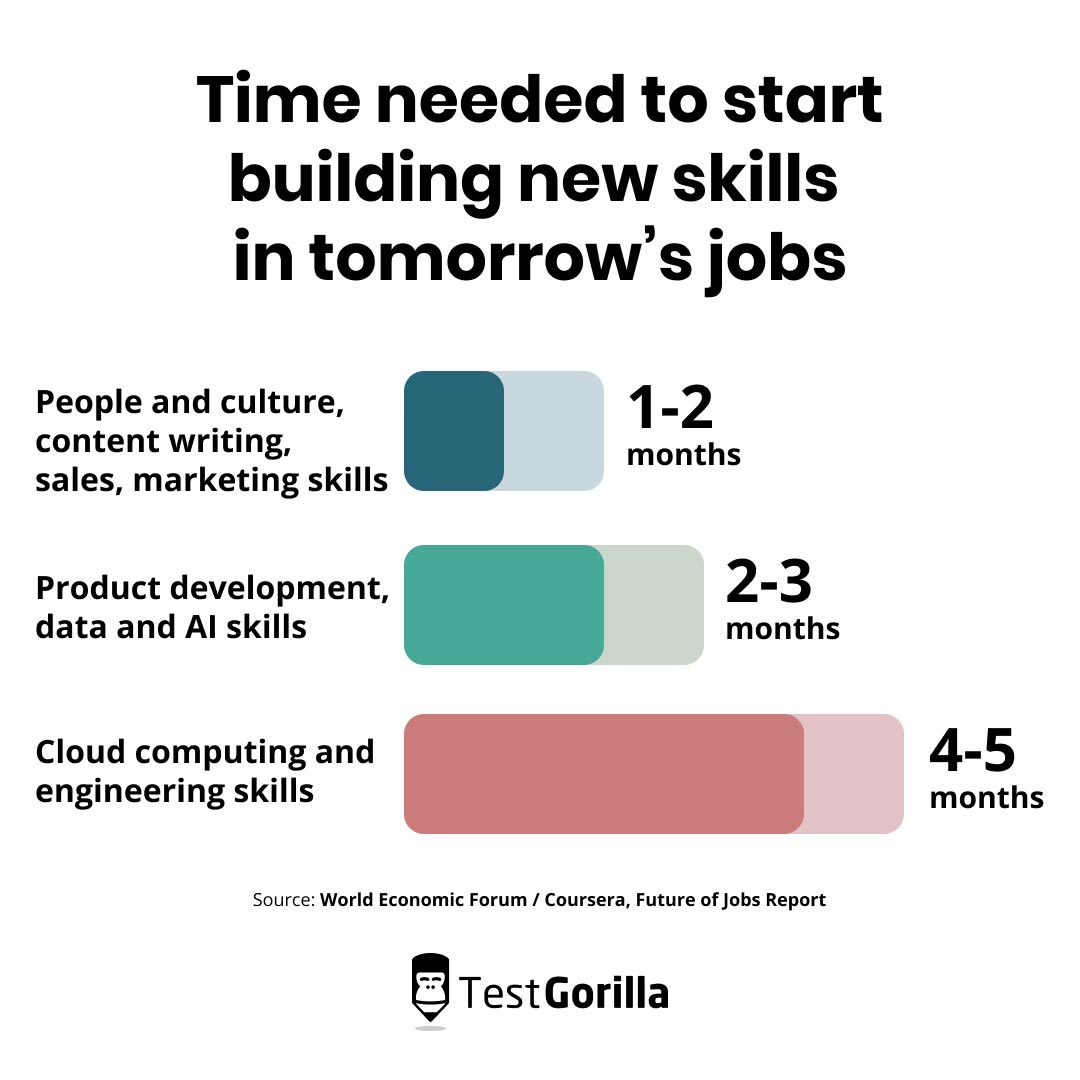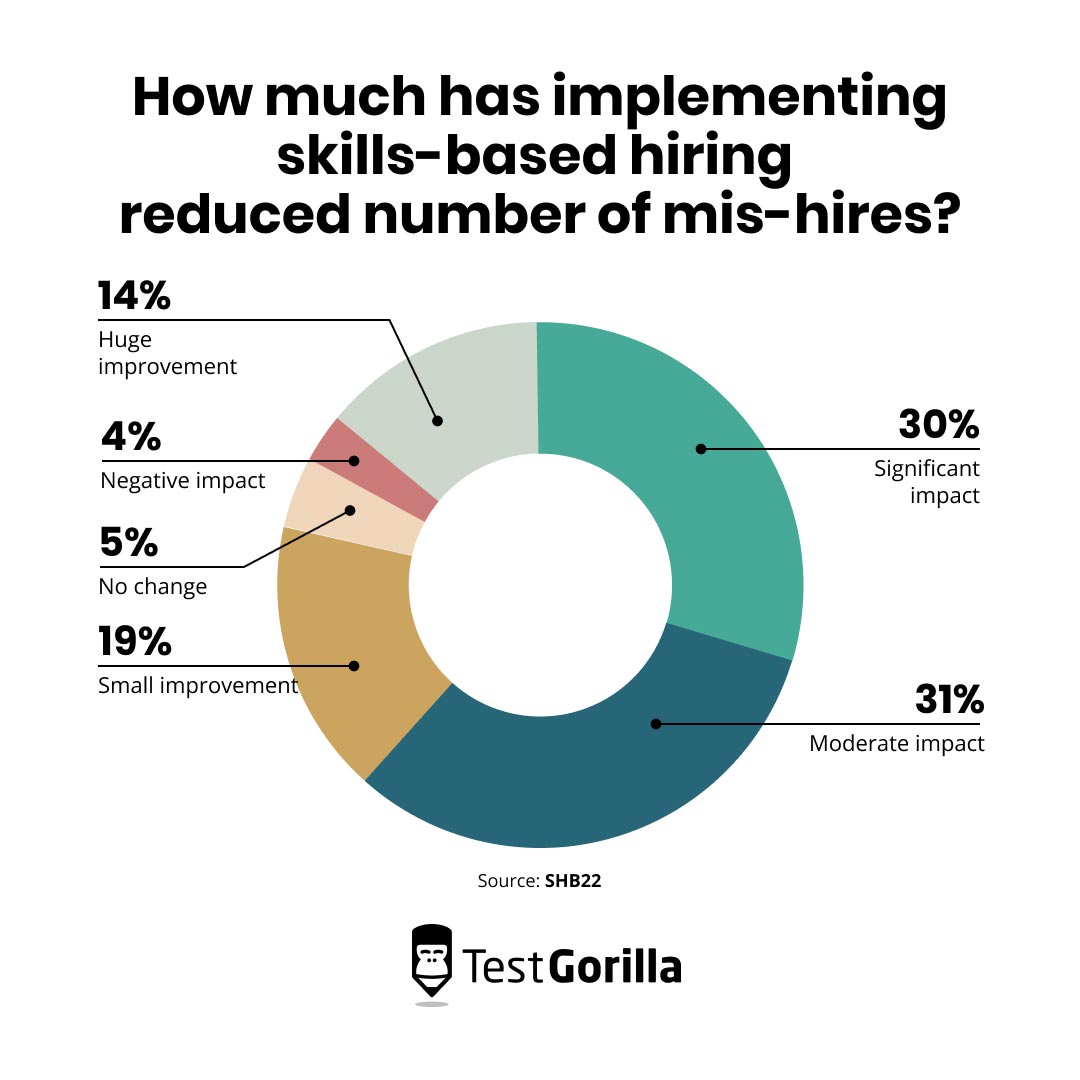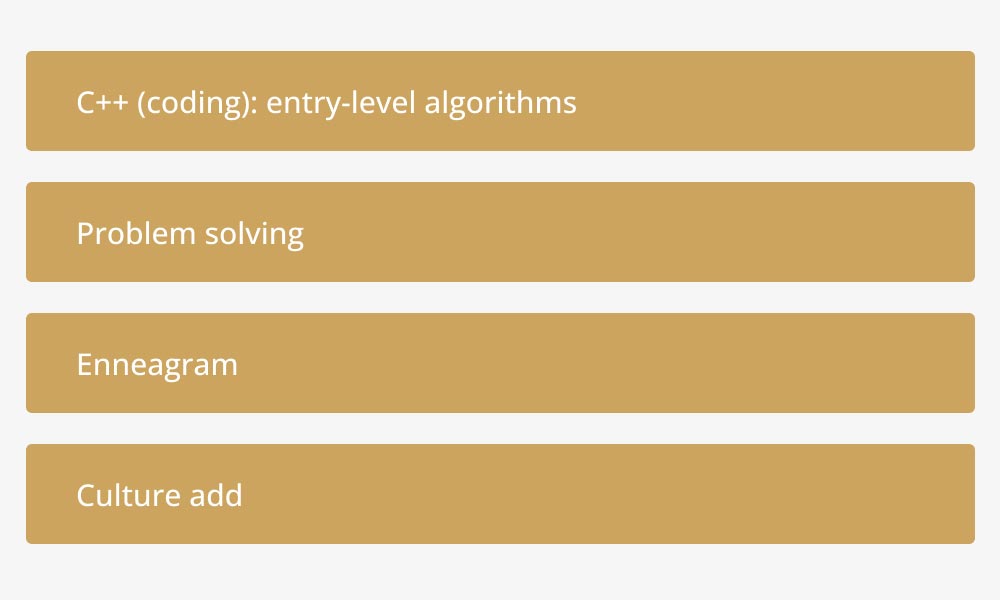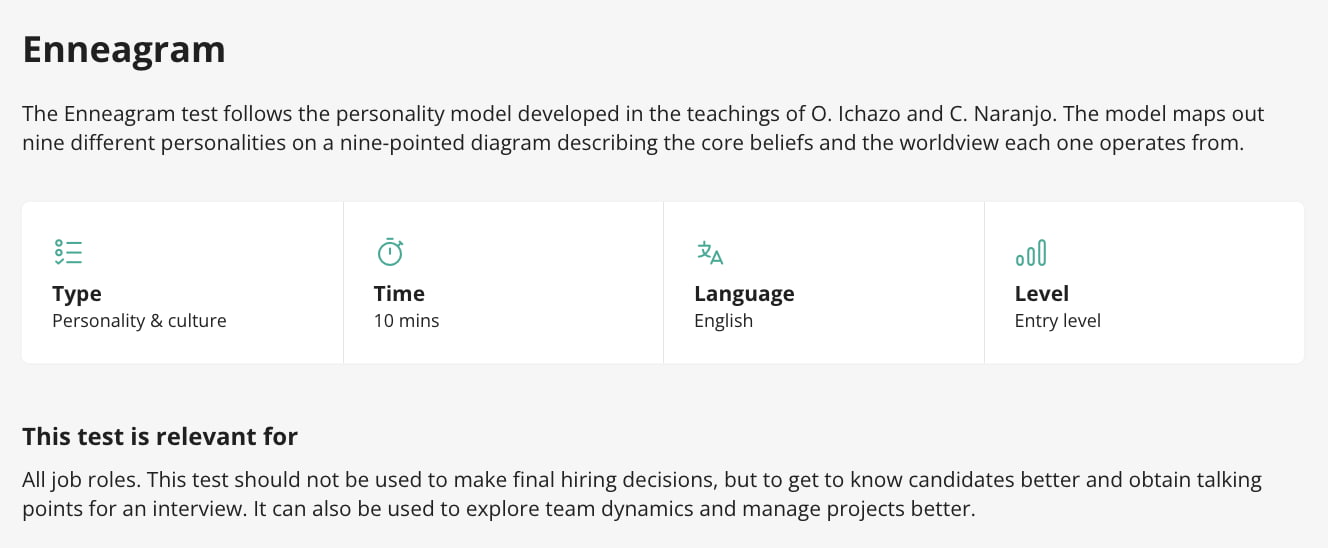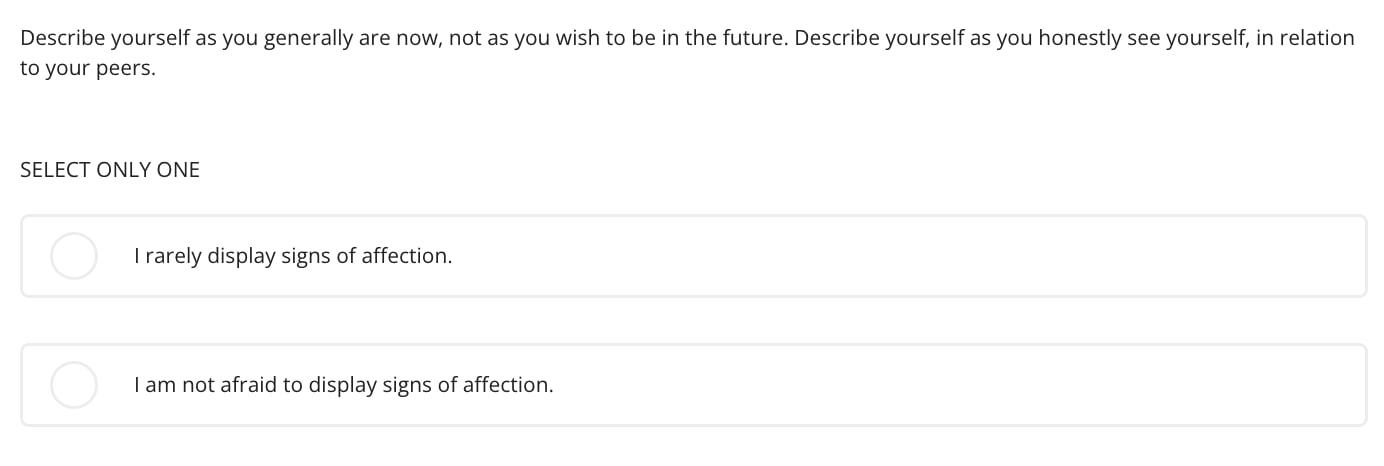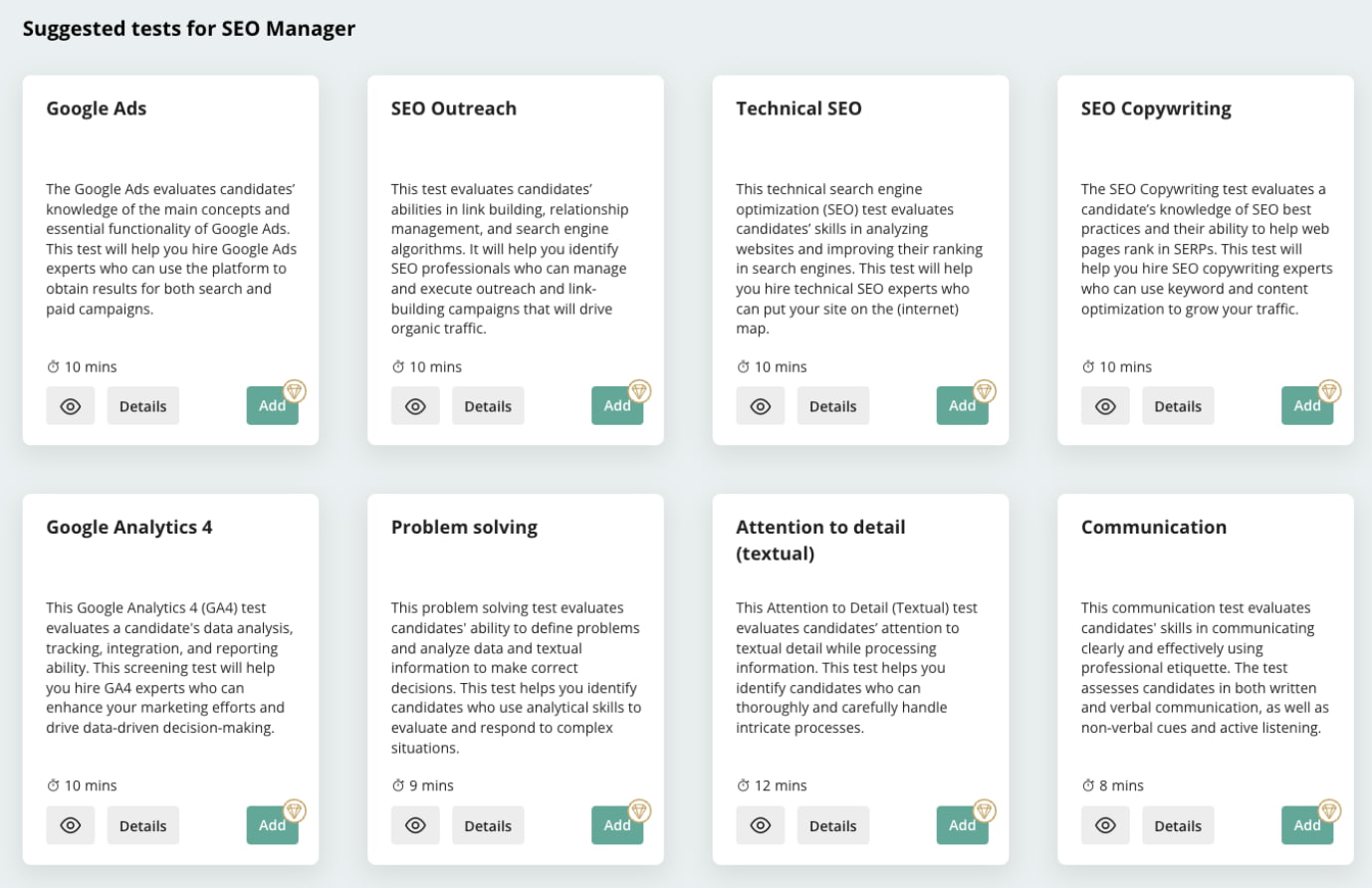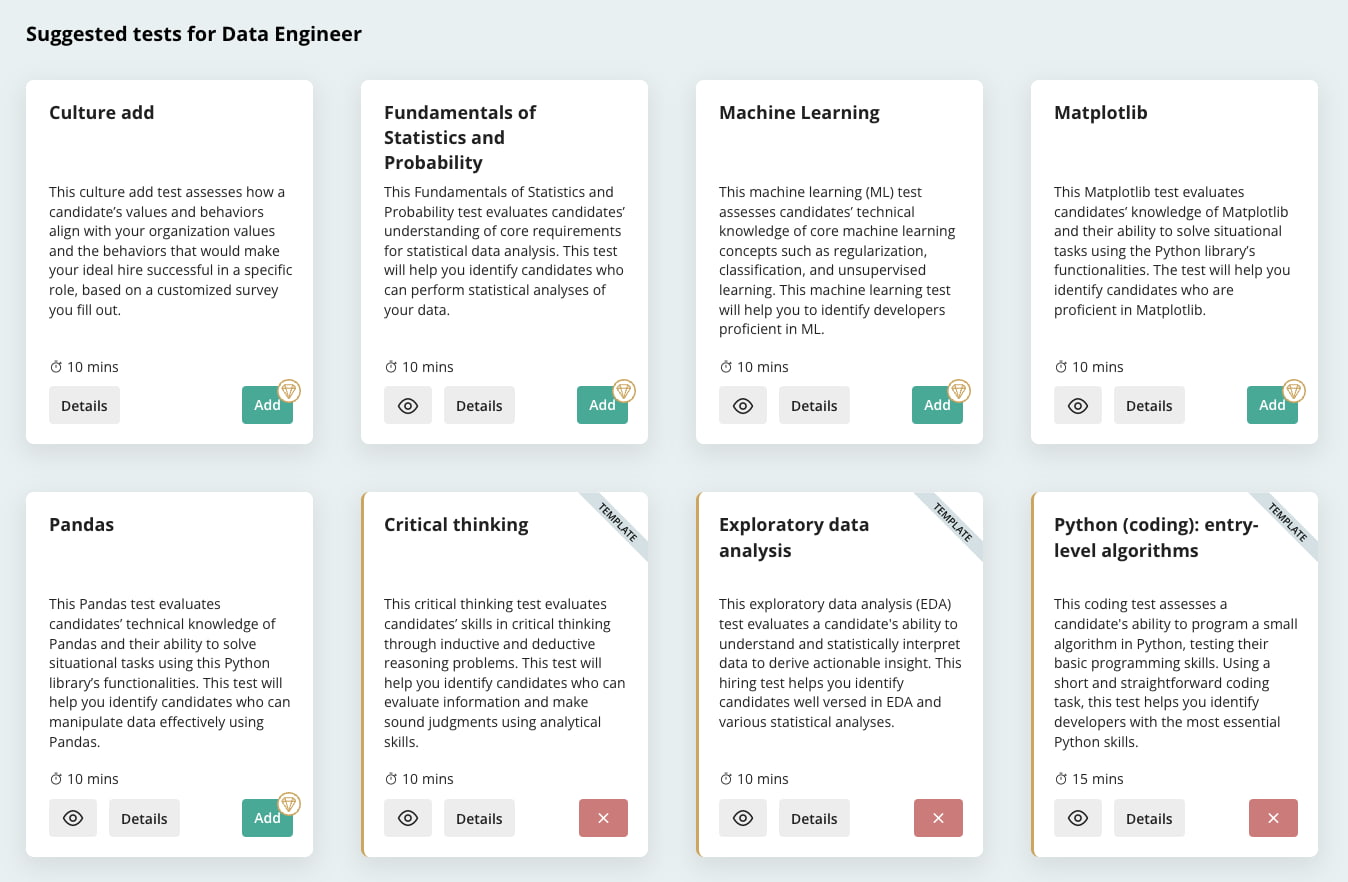Niche skills: How talent assessments help you discover the best recruits for specialized roles
Tech advancements – such as our increasing reliance on artificial intelligence – are forcing companies to hire for niche skills to stay competitive.
These skills are scarce, hard to forecast, in high demand, and constantly changing.
Moreover, niche skills aren’t exclusive to the tech world – many industries face the challenge of attracting, hiring, and retaining niche professionals.
And if you don’t have any experience in a particular niche, it’s even harder to distinguish a passable applicant from an exceptional hire.
Thankfully, with skills testing, you can:
Break down complex roles
Test for the right skills and personality traits
Objectively and confidently gauge your candidates’ niche abilities
Hire niche experts or add them to your talent pool for future hiring initiatives
If that sounds exactly like the help you need, dive into this article and explore how to use assessments to boost your organization’s niche talent acquisition efforts.
If you’re keen to start taking action, jump ahead and start with our eight actionable tips.
Table of contents
- What are niche skills?
- The difficulties with niche talent acquisition
- How talent assessments help with identifying niche skills
- 8 ways to use talent assessments to optimize hiring for niche skills
- Beyond talent assessments: 3 best practices to remember for recruiting niche talent
- Find niche skills for specialized roles with talent assessments
What are niche skills?
Niche skills are specific and unique abilities – usually the result of specialized training and work experience – that help people resolve complex, high-value problems in a particular industry.
People with niche skills add value to businesses through:
Innovative thinking
Critical reflections
Technical insight
Unique perspectives
Niche workers are usually associated with the IT industry and emerging, innovative technologies. However, they exist in every industry requiring highly specialized staff to solve complicated challenges.
Businesses hire people with niche skills to gain an edge over their competitors and better serve their customers.
For instance, look at the artificial intelligence (AI) boom. After generative AI and automation spread beyond cutting-edge tech companies, the demand for generic skills in AI soared, quickly becoming the third-most prioritized corporate training need.
The World Economic Forum confirms that AI is creating millions of jobs, and to fill these roles, companies must hire people specializing in working with this type of technology.
In other words, they need to hire workers based on a niche skill to meet the increasing demand for AI-related products and services.
A few examples of niche skills
Many industries rely on niche skills to create shareholder value and meet customer expectations.
Examples include the FinTech, data science, hospitality, design, security, and legal industries. To give you a better understanding of what counts as a niche ability, here are a few examples that you might hire for if you work in one of the industries above:
Machine learning and AI expertise
Data analysis and visualization
Virtual reality, or VR, and augmented reality, or AR
Cybersecurity
Intellectual property law in Southeast Asian countries
Green architecture for high-rise structures
Blockchain management
Culinary artistry
Antique furniture design
Michelin-star restaurant management
Financial due diligence
Please note this isn’t an exhaustive list, and there are many other niche skills, depending on your industry.
Niche skills vs. general skills
Unlike niche skills, general skills are commonly available, cover a broader range of competencies and abilities, and are transferable across many industries, departments, and roles.
In other words, general skills are the abilities you expect from your employees and comprise a mixture of hard and soft skills (often called power skills).
General skills you could hire for include technical skills but are not limited to them. Examples can be:
Communication
Project management
Selling
Adaptability
Basic IT
Decision-making
Microsoft Suite skills
Cloud computing
Emotional intelligence
It might be tempting to dismiss general skills, but hiring for niche and general skills is fundamental.
Niche skills give you a competitive edge, helping your organization gain a reputation for excellence in your target audience’s mind and become a leader in your market. On the other hand, general skills are the glue that keeps your company running smoothly – enabling your employees to solve problems, communicate clearly, and respond to issues with agility.
A McKinsey & Company survey confirms this combined need for general and niche abilities in its study of 56 foundational skills important for workers to develop over the coming years.
There’s a clear mix of general and niche skills:
The difficulties with niche talent acquisition
Although highly desirable, niche abilities are challenging to find and hire for – and here’s why.
1. Niche skills often require extensive training
Niche skills that put you on a career path, such as an advanced 3D modeling designer or artistic food preparation technician, result from painstaking training and a combination of in-person and online courses.
Research confirms this by showing it could take months of dedicated training for job seekers to learn niche skills and even longer (potentially years) to master them.
Here's a quick overview of how long it takes to gain knowledge for a few important roles:
2. Applicants don’t always list niche skills
Recruiters sometimes struggle to hire for niche skills because applicants don’t always share them on their resumes.
They have to recruit people based on other proxies, risking bad hires.
That said, you can retrain people without niche skills. Recruiters must look at expertise in skills that complement niche abilities – we explore this later on.
3. Niche skills can become obsolete
Some of today’s niche abilities might not be relevant in a few years, particularly if you’re working in an industry affected by technological demand.
Consider the many roles and responsibilities that could disappear because of AI adoption and automation.
Recruiters can avoid the risk of obsolescence by hiring for multiple skills and prioritizing employees who display a wide range of general skills that complement their niche abilities.
You also need to carefully consider whether a niche hire will be a good return on investment. Ask questions like:
How long will their skills be relevant?
How much does it cost to hire and employ them?
Can they move to another role once their primary niche skill becomes obsolete?
How much revenue will they generate?
Based on these questions, you can determine whether or not it’s profitable to proceed with a niche hire.
4. Assessing niche skills through resume screening and interviews is challenging
Checking references and verifying work experience doesn't always guarantee how talented and specialized a candidate is in a specific niche.
What's more, it's not always possible for recruiters to rely on personal knowledge of niche skills when hiring.
For example, consider a web design agency. The rise of AI has forced this company to hire marketers with niche skills in AI image generators to keep production speed and costs competitive.
However, given this technology only emerged in the early 2020s, the agency’s recruiters don’t know much about AI expertise.
They must take what applicants say is experience at face value because they have no experience to reasonably judge talent.
The best insights on HR and recruitment, delivered to your inbox.
Biweekly updates. No spam. Unsubscribe any time.
How talent assessments help with identifying niche skills
The above challenges are easy to counteract with the right talent assessment strategy.
By adding skills testing to your hiring process, you can:
Reduce bad hires
Better assess various competencies
Write clearer job descriptions
Let’s explore these points.
Reduce bad hires
Testing real niche skills with assessments vastly reduces the risk of making bad hires.
Our data proves it: TestGorilla research shows 92.7% of employers surveyed reduced mis-hires by adopting skills tests.
You’re no longer dependent on resumes that give you zero insight into how skilled someone is in a niche area.
By testing, you enable candidates to prove themselves, and it’s easier to judge who’s the best addition to your team.
Better assess various competencies
Custom talent assessments help you measure many niche skills alongside general aptitude.
Remember, you need to test for both because niche skills enable your recruits to resolve the complex problems you’re hiring them to fix.
On the other hand, general skills ensure they get along with their new team and excel in the workplace.
Testing for niche skills is increasing in demand, which is one reason why TestGorilla's assessment library is 300-strong and expanding.
Here’s an example of four skills tests useful for assessing programmers:
The two technical tests – C++ and Android Development using Java – form the niche skill test because they help you identify people who have mastery of both languages.
Big 5 is a personality test that looks at openness, conscientiousness, extroversion, agreeableness, and emotional stability.
Finally, the Culture Add test explains how well a candidate will gel with your team and contribute to developing your company culture.
Write clearer job descriptions
It’s easy to make assumptions about the skills you can find on the job market.
You can assume software engineers should know Javascript and content writers should be proficient in English.
However, making assumptions about job descriptions can lead to you hiring people who don’t have the specific skills you need and aren’t strong culture adds.
Skill assessment platforms help you break down the skills needed for specific roles, so you don’t need to rely on assumptions even if you aren’t an expert in the niche you’re hiring for.
Before you write a job description, you can choose an occupation from your talent assessment builder and reference the suggested tests to help narrow down the skills that make or break a recruit.
You can also use test results from existing employees to decide which skills are most beneficial for the open roles.
You can then gather these requirements and list them explicitly in your job descriptions – a tactic that reduces the danger of hiring people who miss the mark on the specifics you expect of them.
8 ways to use talent assessments to optimize hiring for niche skills
Now you’re clear on why skills tests support niche hiring, let’s explore eight proven ways to use assessments when hunting for specialized skills.
Boost your sourcing strategy for niche skills
Actionable tip | Quick breakdown |
1. Stop relying on resumes and experience | Measure applicants’ skills instead of checking resumes to find hidden niche talent |
2. Bridge skills gaps through training and development | Test applicants to assess niche and general skills so you can develop them when they join you |
3. Hire international and remote talent | Use remote online skills testing and find niche talent without restricting yourself to physical locations |
4. Gauge personality and culture add | Use culture add and personality scoring to make sure niche talent works well with your team |
5. Assess complementary skills | Prioritize evergreen skills and avoid purely hiring for niche skills that could become obsolete |
6. Test with development in mind | Entice niche talent with development opportunities and show candidates you have a plan for their futures |
7. Analyze test results to build an ideal candidate profile | Evaluate your existing workforce to find niche areas to prioritize when hiring in the future |
8. Break down complex roles with individual tests | Use a talent assessment builder to find the skills required for roles and cut down the guesswork when building niche job profiles |
1. Stop relying on resumes and experience
Relying purely on experience and education excludes highly skilled candidates who have developed their abilities in non-conventional ways, like STARs.
Many recruiters use education and experience as “proof” that someone can do the work they’re hiring for – but it doesn’t always mean they have the niche skills you’re after.
For instance, recruiting with a degree as a role requirement shuts out people who’ve developed niche skills through years of self-learning in their spare time.
In recent years, the increasing need for niche talent has led to a decline in bachelor’s degree requirements.
In the case of intensive and critical care nurses, degree requirements have dropped by as much as 12% yearly.
Businesses like Axelerated Solutions, on the other hand, use testing to reduce the subjectivity of resume-based hiring and find the best niche talent regardless of their background.
The firm moved to a TestGorilla-supported assessment process and now hires based on objective talent in niche areas and general skills.
This move successfully sped up its screening process, improved hire quality, and boosted inclusivity.
2. Bridge skills gaps through training and development
It's okay to hire someone who doesn't check all the boxes immediately but shows signs of aptitude and is willing to learn. However, doing so isn't easy when hiring based purely on resumes, references, and experience.
Testing helps you spot skills gaps and decide whether or not you can train a specific employee to the required level.
Let's say you’re hiring a programmer, and the best candidate passes a specialist C++ programming test with the highest score you’ve ever seen but ranks low in Linux.
Thanks to your strong learning and development program and a culture rooted in skills testing, you can leverage this niche hire’s C++ skills while helping them develop their Linux abilities on the job – landing you with exactly the niche developer you need.
You can also add skills testing to employee training and development plans to measure how a recruit’s niche aptitude improves over time.
A great example is JPMorgan Chase.
The multinational bank has invested more than $600m in its New Skills at Work Initiative. This program offers upskilling and reskilling opportunities to motivated candidates stuck in low-skill jobs with no future.
3. Hire international and remote talent
Studies show up to 98% of people want to work remotely, including workers with niche skills. Since niche hiring is already challenging, you don’t want to limit your talent pool by ignoring international and remote applicants.
But what does that have to do with talent assessments?
Flexible skills testing makes international recruiting and remote hiring more efficient because it gives you an objective way to assess for a niche skill set without bringing staff in-house.
You also don’t need to spend ages researching foreign credentials, and since all the tests happen online, you save time and effort in scheduling (and paying for) physical interviews.
4. Gauge personality and culture add
Searching for niche skills doesn't guarantee a candidate is a good addition to your company.
The most desirable employees add to your culture and believe in your ethos and mission. Without gauging personality and culture add, you risk hiring someone who seems to have all the niche skills you need but who refuses to cooperate. Beware the asshole genius – brilliant, innovative, but completely insufferable to work with.
Therefore, create custom assessments that include culture add and personality tests, such as an Enneagram test, to gain insight into what an applicant is like to work with.
Enneagram tests help you split candidates into one of nine personality types and measure desirable traits, i.e., adaptability, loyalty, innovation, and confidence.
They also help you measure the negative traits typical of the asshole genius, such as how aggressive and self-important they are at work.
Here’s how we summarize Enneagram personality testing in our test library:
And here’s an example question from one of our Enneagram tests:
5. Assess complementary skills
Hiring niche experts who can benefit your company even after their niche skill becomes obsolete is nearly impossible unless you build your assessments around complementary skills.
By testing complementary skills, you ensure applicants hit the mark in important, related areas – and you can transfer them to other projects in the future.
TestGorilla's assessment builder helps you implement this suggestion by recommending a mixture of technical, niche, and general skills tests for hundreds of roles.
Let’s say you’re looking for a technical SEO specialist who can help improve how your web content ranks on search engines.
Break down this role into general and niche skills.
You need an SEO specialist to possess general skills such as problem-solving and attention to detail so they can carefully analyze why your content isn’t ranking highly. They need communication skills, too, because they will work closely with different specialists, i.e., graphic designers and digital marketers.
Niche skills tests, such as experience in technical SEO and GA4, show you which candidates can put you at the top of search engine result pages.
Here’s what your assessment might look like:
6. Test with development in mind
Some niche candidates know their worth and bargain with recruiters for more flexibility and learning and development opportunities.
For example, some might only sign a contract if you offer leadership development plans in return for their expertise.
It’s worth selling these attractive characteristics early on so people with niche skills realize you’re the right fit for them.
By testing for leadership potential, you send a clear message to applicants – you’re interested in discovering whether they have the skills to grow and take on managerial responsibility in the future.
You should also follow through on your recruitment promises by offering niche candidates a clear development plan during onboarding and their first few months.
A good example is AT&T, which offers its employees the chance to attend courses at AT&T University and develop their leadership and management skills in a tech-focused educational environment.
7. Analyze test results to build an ideal candidate profile
Test the skills of your existing niche employees to create ideal candidate profiles.
How do they score in niche skill, personality, and power skills assessments?
Use average scores to decide which assessments are the most important in finding ideal candidates for your niche roles.
Then, build job descriptions based on these skills. You’re more likely to hire talent who score highly in those niches when you make the skills required the focus of your job ads.
You can build an ideal candidate profile by also analyzing the skills you don’t have. Use tests to find skills gaps in your existing team – then add those to your ideal profile and make them a focus of your job ads.
8. Break down complex roles with individual tests
Complex roles that demand multiple skills are often difficult to hire for, so recruiters sometimes cut corners by hiring purely on experience, education, and references.
By breaking down complex roles into core and niche skills, recruiters can build custom assessment frameworks to test attributes that are not immediately obvious.
For example, the role of a data engineer carries multiple complex responsibilities.
The ideal hire isn’t just highly competent with statistics, probability, machine learning, and exploratory analysis.
They must also be proficient in critical thinking, experienced in sales and marketing operations, and expert communicators.
Using a custom skills assessment, consider adding multiple tests for each competency you identify.
Here’s an example of our suggested tests for a data engineer:
Breaking down roles this way can help improve the candidate experience because applicants have a clearer understanding of what’s required.
In this case, a data engineer with experience in entry-level Python and Matplotlib knows you need them to work with these niches in the day-to-day role and feel confident applying.
Beyond talent assessments: 3 best practices to remember for recruiting niche talent
Before you start putting our tips to the test, check out these three proven ways to drive niche talent into your firm beyond skill assessments.
Best practice | Why it’s worth trying |
Attend niche industry events | Attract passive talent and find people passionate about the niches you’re targeting |
Harness social media recruiting | Target specific audiences and create an appealing brand that resonates with passive niche candidates |
Use niche job boards | List roles on specific industry boards to find talent who doesn’t use generic listings |
1. Attend niche industry events
Professionals interested in developing in an industry attend events to find niche opportunities.
By representing your company at niche industry events, such as virtual job fairs, you meet people with the skills you need and want to develop further.
Niche industry events also help recruit passive candidates who aren’t actively applying for work and form roughly 70% of your potential pool.[1]
Even if you don't come away with direct applications, there are still opportunities to network and start marketing your organization as an excellent employer.
2. Harness social media recruiting
Good social media management broadens your talent pool and boosts your chances of finding the right niche hire. It’s especially important to find passive candidates who might not be aware of roles requiring their niche skills.
You can interact with them and show these potential applicants your people-first employer brand – an attractive prospect for workers who feel undervalued in their current roles.
Social media recruiting also helps you connect with highly skilled people through demographic and psychographic targeting.
You can niche down your recruitment ads for people who have certain interests or are involved with specific industries.
3. Use niche job boards
Like social media, niche job boards are excellent for connecting with people with the skills to work in specific, challenging niche roles.
They also help you expand your reach because many niche workers turn to skill-specific job boards before looking at major platforms like Indeed or LinkedIn.
This strategy combines with social media recruitment to keep your hiring pool diverse – not everyone with niche skills uses job boards, and some people avoid socials. Use both channels and increase your chances of finding the right people.
Energyfolks is a good example for employees with niche engineering and energy provision skills.[2]
Find niche skills for specialized roles with talent assessments
If talented specialists with niche skills continue to elude you, it's time to change how you recruit.
Instead of relying on resumes and experience checks, use talent assessments to hire for niche skills and:
Judge candidates based on what they can do, not their experience
Attract people with the right skills who want to learn and develop
Assess general abilities that complement the niche skills your company requires
Build a stronger talent pool for future niche hiring opportunities
Skills testing isn’t only ideal for attracting and developing niche talent.
You can also use assessments to hire the best interns and handle employee promotions fairly and bias-freely.
If you're unsure how to start testing your employees, take a look at our personality assessments – i.e., the DISC test and Enneagram test – and say no to the asshole genius.
Sources
“The Ultimate List of Hiring Statistics For Hiring Managers, HR Professionals, and Recruiters”. LinkedIn Talent Solutions. Retrieved September 15, 2023. https://business.linkedin.com/content/dam/business/talent-solutions/global/en_us/c/pdfs/Ultimate-List-of-Hiring-Stats-v02.04.pdf
“Energyfolks Jobs”. Energyfolks. Retrieved September 15, 2023. https://www.energyfolks.com/jobs
You've scrolled this far
Why not try TestGorilla for free, and see what happens when you put skills first.


